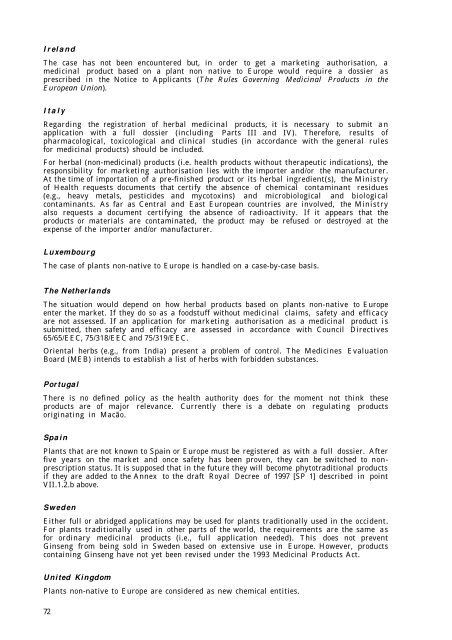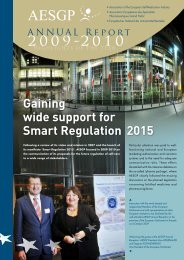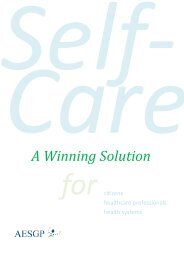Herbal medicinal products in the European Union - AESGP
Herbal medicinal products in the European Union - AESGP
Herbal medicinal products in the European Union - AESGP
Create successful ePaper yourself
Turn your PDF publications into a flip-book with our unique Google optimized e-Paper software.
Ireland<br />
The case has not been encountered but, <strong>in</strong> order to get a market<strong>in</strong>g authorisation, a<br />
<strong>medic<strong>in</strong>al</strong> product based on a plant non native to Europe would require a dossier as<br />
prescribed <strong>in</strong> <strong>the</strong> Notice to Applicants (The Rules Govern<strong>in</strong>g Medic<strong>in</strong>al Products <strong>in</strong> <strong>the</strong><br />
<strong>European</strong> <strong>Union</strong>).<br />
Italy<br />
Regard<strong>in</strong>g <strong>the</strong> registration of herbal <strong>medic<strong>in</strong>al</strong> <strong>products</strong>, it is necessary to submit a n<br />
application with a full dossier (<strong>in</strong>clud<strong>in</strong>g Parts III and IV). Therefore, results of<br />
pharmacological, toxicological and cl<strong>in</strong>ical studies (<strong>in</strong> accordance with <strong>the</strong> general rules<br />
for <strong>medic<strong>in</strong>al</strong> <strong>products</strong>) should be <strong>in</strong>cluded.<br />
For herbal (non-<strong>medic<strong>in</strong>al</strong>) <strong>products</strong> (i.e. health <strong>products</strong> without <strong>the</strong>rapeutic <strong>in</strong>dications), <strong>the</strong><br />
responsibility for market<strong>in</strong>g authorisation lies with <strong>the</strong> importer and/or <strong>the</strong> manufacturer.<br />
At <strong>the</strong> time of importation of a pre-f<strong>in</strong>ished product or its herbal <strong>in</strong>gredient(s), <strong>the</strong> M<strong>in</strong>istry<br />
of Health requests documents that certify <strong>the</strong> absence of chemical contam<strong>in</strong>ant residues<br />
(e.g., heavy metals, pesticides and mycotox<strong>in</strong>s) and microbiological and biological<br />
contam<strong>in</strong>ants. As far as Central and East <strong>European</strong> countries are <strong>in</strong>volved, <strong>the</strong> M<strong>in</strong>istry<br />
also requests a document certify<strong>in</strong>g <strong>the</strong> absence of radioactivity. If it appears that <strong>the</strong><br />
<strong>products</strong> or materials are contam<strong>in</strong>ated, <strong>the</strong> product may be refused or destroyed at <strong>the</strong><br />
expense of <strong>the</strong> importer and/or manufacturer.<br />
Luxembourg<br />
The case of plants non-native to Europe is handled on a case-by-case basis.<br />
The Ne<strong>the</strong>rlands<br />
The situation would depend on how herbal <strong>products</strong> based on plants non-native to Europe<br />
enter <strong>the</strong> market. If <strong>the</strong>y do so as a foodstuff without <strong>medic<strong>in</strong>al</strong> claims, safety and efficacy<br />
are not assessed. If an application for market<strong>in</strong>g authorisation as a <strong>medic<strong>in</strong>al</strong> product is<br />
submitted, <strong>the</strong>n safety and efficacy are assessed <strong>in</strong> accordance with Council Directives<br />
65/65/EEC, 75/318/EEC and 75/319/EEC.<br />
Oriental herbs (e.g., from India) present a problem of control. The Medic<strong>in</strong>es Evaluation<br />
Board (MEB) <strong>in</strong>tends to establish a list of herbs with forbidden substances.<br />
Portugal<br />
There is no def<strong>in</strong>ed policy as <strong>the</strong> health authority does for <strong>the</strong> moment not th<strong>in</strong>k <strong>the</strong>se<br />
<strong>products</strong> are of major relevance. Currently <strong>the</strong>re is a debate on regulat<strong>in</strong>g <strong>products</strong><br />
orig<strong>in</strong>at<strong>in</strong>g <strong>in</strong> Macão.<br />
Spa<strong>in</strong><br />
Plants that are not known to Spa<strong>in</strong> or Europe must be registered as with a full dossier. After<br />
five years on <strong>the</strong> market and once safety has been proven, <strong>the</strong>y can be switched to nonprescription<br />
status. It is supposed that <strong>in</strong> <strong>the</strong> future <strong>the</strong>y will become phytotraditional <strong>products</strong><br />
if <strong>the</strong>y are added to <strong>the</strong> Annex to <strong>the</strong> draft Royal Decree of 1997 [SP 1] described <strong>in</strong> po<strong>in</strong>t<br />
VII.1.2.b above.<br />
Sweden<br />
Ei<strong>the</strong>r full or abridged applications may be used for plants traditionally used <strong>in</strong> <strong>the</strong> occident.<br />
For plants traditionally used <strong>in</strong> o<strong>the</strong>r parts of <strong>the</strong> world, <strong>the</strong> requirements are <strong>the</strong> same as<br />
for ord<strong>in</strong>ary <strong>medic<strong>in</strong>al</strong> <strong>products</strong> (i.e., full application needed). This does not prevent<br />
G<strong>in</strong>seng from be<strong>in</strong>g sold <strong>in</strong> Sweden based on extensive use <strong>in</strong> Europe. However, <strong>products</strong><br />
conta<strong>in</strong><strong>in</strong>g G<strong>in</strong>seng have not yet been revised under <strong>the</strong> 1993 Medic<strong>in</strong>al Products Act.<br />
United K<strong>in</strong>gdom<br />
Plants non-native to Europe are considered as new chemical entities.<br />
72




